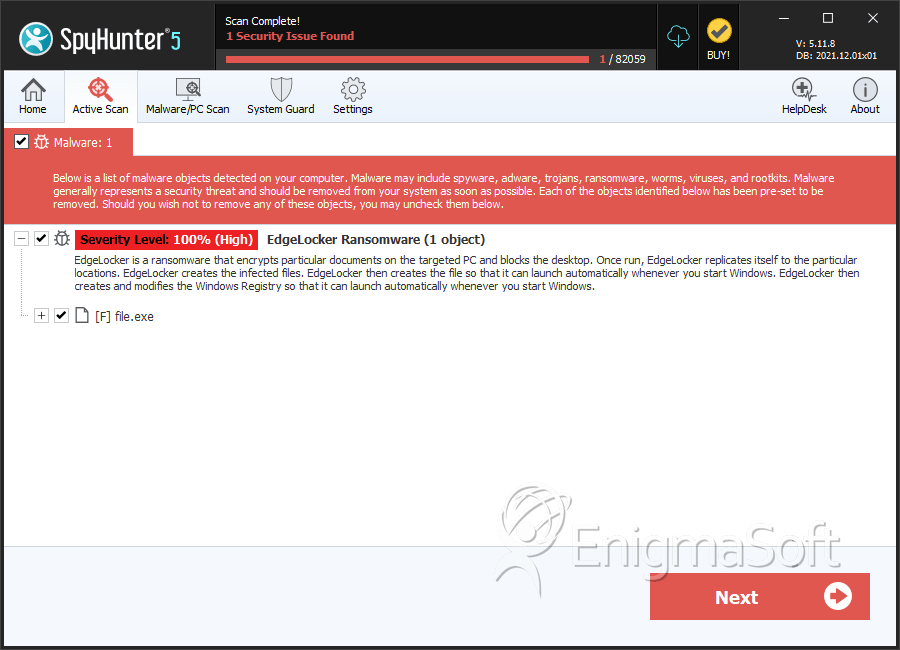EdgeLocker Ransomware
The EdgeLocker Ransomware is an encryption ransomware Trojan. Threats like the EdgeLocker Ransomware enter a computer and take it hostage until the victim pays a large sum. To take the victim's computer hostage, the EdgeLocker Ransomware encrypts the victim's files using a strong encryption algorithm. The encrypted files become inaccessible without the decryption key, which the con artists hold in their possession. The EdgeLocker Ransomware represents a real threat to the computer users' data, and preventive steps should be taken to limit the damage of a possible EdgeLocker Ransomware attack.
Table of Contents
How the EdgeLocker Ransomware Puts Computer Users on the Edge
The EdgeLocker Ransomware is designed to enter the victim's computer undetected, delivered in a corrupted spam email attachment. During its attack, the EdgeLocker Ransomware uses the RSA encryption to make the victim's files inaccessible. Files that have been affected by the EdgeLocker Ransomware threat are easy to identify because their extension will be changed to '.edge1.' After encrypting the victim's files, the EdgeLocker Ransomware delivers its ransom note, instructing the victim to pay a ransom in exchange for the decryption key. The EdgeLocker Ransomware delivers its ransom note in the form of a pop-up window. The ransom note's delivery method can change from one encryption ransomware variant to another. For example, some threats drop text files on the victim's computer.
How the EdgeLocker Ransomware Carries out Its Attack
Once the EdgeLocker Ransomware has encrypted the victim's files, its ransom note informs the victim of what has happened. Unfortunately, the EdgeLocker Ransomware uses a strong encryption method which may make it impossible to recover the files that have been encrypted by the EdgeLocker Ransomware. The decryption key needed to recover the affected files is stored on the EdgeLocker Ransomware's Command and Control server. The people responsible for the EdgeLocker Ransomware attack demand payment of 0.1 BitCoin, which is approximate $100 USD at the current exchange rate. Although this amount is considerably lower than most other ransomware Trojans active today, PC security researchers strongly advise against paying the ransom.
The people that carry out these attacks cannot be trusted, and the EdgeLocker Ransomware is not an exception. In many cases, the computer users will be tricked; these people may ignore the victim's payment, deliver a decryption key that does not work or even ask for more money. Furthermore, paying the EdgeLocker Ransomware ransom finances the creation and development of more threats. Instead, you should take preemptive measures to ensure that the EdgeLocker Ransomware does not enter a computer and limit the damage from an attack if it does manage to infiltrate your PC.
Below is the full text of the EdgeLocker Ransomware ransom note:
'>>> Your files are encrypted by the EdgeLocker ransomware!
>>> Nobody can decrypt your files without a special RSA private key.
>>> YOU can obtain this key by purchasing it for 0.1 Bitcoin from us.
>>> Pay 0.1 BTC on the address 1LYFaPgwCFBnn5BQsSxRmEZ94nKj7tDDVA and then press "Check Payment"
>>> The payment is not received instantly, don't worry.
>>> Key'
Dealing with the EdgeLocker Ransomware and Preventing the EdgeLocker Ransomware Attacks
There are countless ransomware variants active today that use an attack identical to the EdgeLocker Ransomware. Fortunately, protecting your computer from these kinds of attacks is not complicated. To prevent the EdgeLocker Ransomware and other ransomware Trojans from entering your computer, PC security researchers advise the use of a reliable anti-malware program that is fully up-to-date. It is also essential to handle email carefully and to avoid opening unsolicited email attachments or embedded links. To limit the damage of an EdgeLocker Ransomware attack, PC security researchers strongly advise computer users to backup all files on the cloud or an external memory device. Having backups and being able to recover affected the files from a backup limits the EdgeLocker Ransomware attack, taking away the leverage that enables con artists to demand ransom payments from the victims.
SpyHunter Detects & Remove EdgeLocker Ransomware

File System Details
| # | File Name | MD5 |
Detections
Detections: The number of confirmed and suspected cases of a particular threat detected on
infected computers as reported by SpyHunter.
|
|---|---|---|---|
| 1. | file.exe | 99c28ccc3ad71f209aeab165265d7863 | 0 |


Submit Comment
Please DO NOT use this comment system for support or billing questions. For SpyHunter technical support requests, please contact our technical support team directly by opening a customer support ticket via your SpyHunter. For billing issues, please refer to our "Billing Questions or Problems?" page. For general inquiries (complaints, legal, press, marketing, copyright), visit our "Inquiries and Feedback" page.